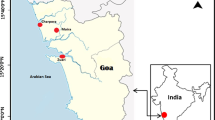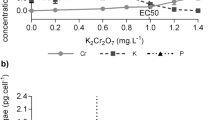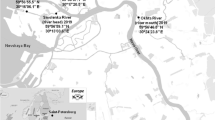Abstract
In this study, the presence of anthropogenic gadolinium (Gd) was evaluated in rivers, close to wastewater treatment plant outputs. Then, one site was selected for in situ experiments to assess the bioaccumulation of Gd in the digestive gland and in the gills of two bivalves (Dreissena rostriformis bugensis and Corbicula fluminea). For both organisms, the results suggested that the bioaccumulation of Gd can be observed when organisms are exposed in a geogenic and anthropogenic Gd mixture. In order to observe if Gd can bioaccumulate in tissues of bivalves when the ion is only present as the main anthropogenic speciation of Gd, i.e., Gd-contrast agents (Gd-CAs), the gadoteric acid was used for a laboratory experiment. In this case, the presence of Gd was clearly detected in a significant amount in the digestive glands of D. rostriformis bugensis and C. fluminea while low concentrations are measured in the gills. For the first time, these results clearly showed that Gd can bioaccumulate in bivalve tissues even when it is only present as Gd-CAs. Biochemical activities were measured in the digestive gland and in the gills of the bivalves to assess the effects of Gd-CA bioaccumulation. No significant variations were observed in the gills. Concerning the digestive gland, after 7 days of exposure at 10 μg L−1 of Gd as Gd-CA speciation, GST activity in D. rostriformis bugensis and lipid hydroperoxide and mitochondrial electron transfer system in C. fluminea had increased. The results suggest an acclimation of the organisms to the presence of Gd-CAs in the medium within less than 21 days.





Similar content being viewed by others
Explore related subjects
Discover the latest articles and news from researchers in related subjects, suggested using machine learning.References
Abraham JL, Thakral C (2008) Tissue distribution and kinetics of gadolinium and nephrogenic systemic fibrosis. Eur J Radiol 66:200–207
Achard M (2004) Induction of a multixenobiotic resistance protein (MXR) in the Asiatic clam Corbicula fluminea after heavy metals exposure. Aquat Toxicol 67:347–357. doi:10.1016/j.aquatox.2004.01.014
Bau M, Dulski P (1996) Anthropogenic origin of positive gadolinium anomalies in river waters. Earth Planet Sci Lett 143:245–255. doi:10.1016/0012-821X(96)00127-6
Beers RF, Sizer IW (1952) A spectrophotometric method for measuring the breakdown of hydrogen peroxide by catalase. J Biol Chem 195:133–140
Bellin MF, Van Der Molen AJ (2008) Extracellular gadolinium-based contrast media: an overview. Eur J Radiol 66:160–167
Brücher E (2002) Kinetic stabilities of gadolinium(III) chelates used as MRI contrast agents. In: Krause W (ed) Contrast agents I. Topics in Current Chemistry. Springer, Berlin Heidelberg, pp 103–122
Elbaz-Poulichet F, Seidel JL, Othoniel C (2002) Occurrence of an anthropogenic gadolinium anomaly in river and coastal waters of southern France. Water Res 36:1102–1105. doi:10.1016/S0043-1354(01)00370-0
Garaud M, Trapp J, Devin S, Cossu-Leguille C, Pain-Devin S, Felten V, Giamberini L (2015) Multibiomarker assessment of cerium dioxide nanoparticle (nCeO2) sublethal effects on two freshwater invertebrates, Dreissena polymorpha and Gammarus roeseli. Aquat Toxicol 158:63–74. doi:10.1016/j.aquatox.2014.11.004
Hao S, Xiaorong W, Liansheng W, Lemei D, Zhong L, Yijun C (1997) Bioconcentration of rare earth elements lanthanum, gadolinium and yttrium in algae (Chlorella Vulgarize Beijerinck): influence of chemical species. Chemosphere 34:1753–1760. doi:10.1016/S0045-6535(97)00031-3
Idée J-M, Fretellier N, Thurnher MM, Bonnemain B, Corot C (2015) Physico-chimie et profil toxicologique d’agents de contraste pour l’imagerie par résonance magnétique, les chélates de gadolinium. Ann Pharm Fr 73:266–276. doi:10.1016/j.pharma.2015.01.001
Kulaksız S, Bau M (2013) Anthropogenic dissolved and colloid/nanoparticle-bound samarium, lanthanum and gadolinium in the Rhine River and the impending destruction of the natural rare earth element distribution in rivers. Earth Planet Sci Lett 362:43–50. doi:10.1016/j.epsl.2012.11.033
Kulaksız S, Bau M (2011) Anthropogenic gadolinium as a microcontaminant in tap water used as drinking water in urban areas and megacities. Appl Geochem 26:1877–1885. doi:10.1016/j.apgeochem.2011.06.011
Lawrence MG, Ort C, Keller J (2009) Detection of anthropogenic gadolinium in treated wastewater in South East Queensland. Australia Water Res 43:3534–3540. doi:10.1016/j.watres.2009.04.033
Lindner U, Lingott J, Richter S, Jakubowski N, Panne U (2013) Speciation of gadolinium in surface water samples and plants by hydrophilic interaction chromatography hyphenated with inductively coupled plasma mass spectrometry. Anal Bioanal Chem 405:1865–1873
McDonald RJ, McDonald JS, Kallmes DF, Jentoft ME, Murray DL, Thielen KR, Williamson EE, Eckel LJ (2015) Intracranial gadolinium deposition after contrast-enhanced MR imaging. Radiology 275:772–782. doi:10.1148/radiol.15150025
Merschel G, Bau M (2015) Rare earth elements in the aragonitic shell of freshwater mussel Corbicula fluminea and the bioavailability of anthropogenic lanthanum, samarium and gadolinium in river water. Sci Total Environ 533:91–101. doi:10.1016/j.scitotenv.2015.06.042
Merschel G, Bau M, Baldewein L, Dantas EL, Walde D, Bühn B (2015) Tracing and tracking wastewater-derived substances in freshwater lakes and reservoirs: anthropogenic gadolinium and geogenic REEs in Lake Paranoá. Brasilia Comptes Rendus Geosci 347:284–293. doi:10.1016/j.crte.2015.01.004
Möller P, Paces T, Dulski P, Morteani G (2002) Anthropogenic Gd in surface water, drainage system, and the water supply of the City of Prague, Czech Republic. Environ. Sci. Technol. 36:2387–2394. doi:10.1021/es010235q
NF EN ISO 9963-1 (1996) Qualité de l’eau—Détermination de l’alcalinité - Partie 1 : détermination de l’alcalinité totale et composite
Nozaki Y, Lerche D, Alibo DS, Tsutsumi M (2000) Dissolved indium and rare earth elements in three Japanese rivers and Tokyo Bay: evidence for anthropogenic Gd and In. Geochim Cosmochim Acta 64:3975–3982. doi:10.1016/S0016-7037(00)00472-5
Sato T, Ito K, Tamada T, Kanki A, Watanabe S, Nishimura H, Tanimoto D, Higashi H, Yamamoto A (2013) Tissue gadolinium deposition in renally impaired rats exposed to different gadolinium-based MRI contrast agents: evaluation with inductively coupled plasma mass spectrometry (ICP-MS). Magn Reson Imaging 31:1412–1417. doi:10.1016/j.mri.2013.03.025
Taylor, S.R., McLennan, S.M. (1985) The continental crust: its composition and evolution. 312 pp. Oxford, London, Edinburgh, Boston, Palo Alto, Melbourne: Blackwell Scientific., Geological Magazine
Telgmann L, Sperling M, Karst U (2013) Determination of gadolinium-based MRI contrast agents in biological and environmental samples: a review. Anal Chem Acta 764:1–16. doi:10.1016/j.aca.2012.12.007
Telgmann L, Wehe CA, Birka M, Künnemeyer J, Nowak S, Sperling M, Karst U (2012) Speciation and isotope dilution analysis of gadolinium-based contrast agents in wastewater. Environ Sci Technol 46:11929–11936. doi:10.1021/es301981z
Zhu Y, Hoshino M, Yamada H, Itoh A, Haraguchi H (2004) Gadolinium anomaly in the distributions of rare earth elements observed for coastal seawater and river waters around Nagoya City. Bull Chem Soc Jpn 77:1835–1842. doi:10.1246/bcsj.77.1835
Acknowledgments
The authors are grateful to Philippe Wagner for his help with water sampling, and they warmly thank Mrs. Doyen for her English corrections.
This work has been supported by the Lorraine region; by the French National Research Agency through the Investissements d’avenir national program, with the following reference: ANR-10-LABX-21-01/LABEX RESSOURCES 21; and by the CNRS-INSU coordination through the EC2CO-ECODYN program.
Author information
Authors and Affiliations
Corresponding authors
Additional information
Responsible editor: Cinta Porte
Rights and permissions
About this article
Cite this article
Perrat, E., Parant, M., Py, JS. et al. Bioaccumulation of gadolinium in freshwater bivalves. Environ Sci Pollut Res 24, 12405–12415 (2017). https://doi.org/10.1007/s11356-017-8869-9
Received:
Accepted:
Published:
Issue Date:
DOI: https://doi.org/10.1007/s11356-017-8869-9




